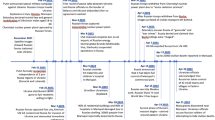Abstract
This study reflects an attempt to assess posttraumatic stress disorder (PTSD) in a radically nonwestern culture, that of the Kalahari Bushmen, the Ju/'hoansi. After translating DSM-IV PTSD symptoms into their difficult and click-laden language, potential participants were nominated by village elders who were aware of domestic violence and symptoms during the preceding year. Ten men and 10 women, identified as meeting Criteria A, E, and F, were interviewed regarding their symptoms. Thirty-five percent of the sample met the criteria for PTSD for incidents occurring within the past year. All participants met the reexperiencing and arousal criteria but many otherwise distressed participants did not meet the avoidance criterion for PTSD. These results compare closely with PTSD assessments in other non-Western societies, while providing some empirical support of two new ideas about how the avoidance behaviors in such societies might be reconciled with information-processing theories of PTSD.
Similar content being viewed by others
References
American Psychiatric Association. (1994). Diagnostic and statistical manual of mental disorders (4th ed.). Washington, DC: Author.
Barnard, A. (1992). Hunters and herders of Southern Africa: A comparative ethnography of the Khoisan peoples. Cambridge, England: Cambridge University Press.
Botelle, A., & Rohde, R. (1995). Those who live on the land: A socio-economic baseline survey for land use planning in the communal areas of Eastern Otjozondjupa. Windhoek, Namibia: Ministry of Lands, Resettlement, and Rehabilitation, Republic of Namibia.
Chakraborty, A. (1991). Culture, colonialism, and psychiatry. Lancet, 337, 1204–1207.
De Girolamo, G., & McFarlane, A. C. (1996). The epidemiology of PTSD: A comprehensive review of the international literature. In A. J. Marsella, M. J. Friedman, E. T. Gerrity, & R. M. Scurfield (Eds.), Ethnocultural aspects of posttraumatic stress disorder: Issues, research, and clinical applications (pp. 33–85). Washington, DC: American Psychological Association.
Dickens, P. (1994). English-Ju/'hoan, Ju/'hoan-English dictionary. Cologne, Germany: Ruediger Koeppe Verlag.
Draper, P. (1999). Room to maneuver: !Kung women cope with men. In D. A. Counts, J. K. Brown, & J. C. Campbell (Eds.), To have and to hit: Cultural perspectives on wife beating (pp. 53–72). Boulder, CO: Westview.
Foa, E. B., Steketee, G., & Rothbaum, B. O. (1989). Behavioral/cognitive conceptualization of post-traumatic stress disorder. Behavior Therapy, 20, 155–176.
Frey, C. (2001). Post traumatic stress disorder and culture. In A. T. Yilmaz, M. G. Weiss, & A. Riecher-Rossler (Eds.), Cultural psychiatry: Euro-international perspectives (pp. 103–116). Basil, Switzerland: Karger.
Golding, J. M. (1999). Intimate partner violence as a risk factor for mental disorders: A meta-analysis. Journal of Family Violence, 14, 99–132.
Katz, R. (1984). Boiling energy. Cambridge, MA: Harvard University Press.
Katz, R., Biesele, M., & St. Denis, V. (1997). Healing makes our hearts happy: Spiritual and cultural transformations among the Kalahari Ju/'hoansi. Rochester, VT: Inner Traditions.
Keane, T. M., Kaloupek, D. G., & Weathers, F. W. (1996). Ethnocultural considerations in the assessment of PTSD. In A. J. Marsella, M. J. Friedman, E. T. Gerrity, & R. M. Scurfield (Eds.), Ethnocultural aspects of posttraumatic stress disorder: Issues, research, and clinical applications (pp. 183–205). Washington, DC: American Psychological Association.
Kleber, R. J., Figley, C. R., & Gersons, B. P. R. (Eds.). (1995). Beyond trauma: Cultural and social dynamics. New York: Plenum.
Lee, R. B. (1979). The !Kung San: Men, women, and work in a foraging society. Cambridge, England: Cambridge University Press.
Marsella, A. J., Friedman, M. J., Gerrity, E. T., & Scurfield, R. M. (Eds.). (1996a). Ethnocultural aspects of posttraumatic stress disorder: Issues, research, and clinical applications. Washington, DC: American Psychological Association.
Marsella, A. J., Friedman, M. J., Gerrity, E. T., & Scurfield, R. M. (1996b). Ethnocultural aspects of PTSD: Some closing thoughts. In A. J. Marsella, M. J. Friedman, E. T. Gerrity, & R. M. Scurfield (Eds.), Ethnocultural aspects of posttraumatic stress disorder: Issues, research, and clinical applications (pp. 529–538). Washington, DC: American Psychological Association.
Marshall, L. (1961). Sharing, talking and giving: Relief of social tensions among !Kung Bushmen. Africa, 31, 231–249.
Marshall, L. (1976). The !Kung of Nyae Nyae. Cambridge, MA: Harvard University Press.
Marshall, J., & Ritchie, C. (1984). Where are the Ju/wasi of Nyae Nyae? Changes in a Bushman society: 1958–1981. Cape Town, South Africa: Centre for African Studies, University of Cape Town.
McCall, G. J. (2000June). Interpersonal disputing among Kalahari Bushmen. Paper presented at the International Conference on Personal Relationships, Brisbane, Australia.
McCall, G. J., & Simmons, J. L. (1969). Issues in participant observation. Reading, MA: Addison-Wesley.
McCall, G. S. (2000). Ju/'hoansi adaptations to a cash economy. African Sociological Review, 4, 138–155.
Resick, P. A. (2001). Stress and trauma. London: Psychology Press.
Smith, A., Malherbe, C., Guenther, M., & Berens, P. (2000). The Bushmen of Southern Africa: A foraging society in transition. Cape Town, South Africa: David Philip.
Thomas, E. M. (1959). The harmless people. New York: Knopf.
Wiessner, P. (1996). Leveling the hunter: Constraints on the status quest in foraging societies. In P. Wiessner & W. Schiefenhövel (Eds.), Food and the status quest: An interdisciplinary perspective (pp. 171–191). Oxford: Berghan Books.
Wiessner, P. (1998). Population, subsistence, and social relations in the Nyae Nyae area: three decades of change. Unpublished manuscript, University of Utah.
Wilson, J. P., & Raphael, B. (Eds.). (1993). International handbook of traumatic stress syndromes. New York: Plenum.
Author information
Authors and Affiliations
Corresponding author
About this article
Cite this article
McCall, G.J., Resick, P.A. A Pilot Study of PTSD Symptoms Among Kalahari Bushmen. J Trauma Stress 16, 445–450 (2003). https://doi.org/10.1023/A:1025702326392
Issue Date:
DOI: https://doi.org/10.1023/A:1025702326392



